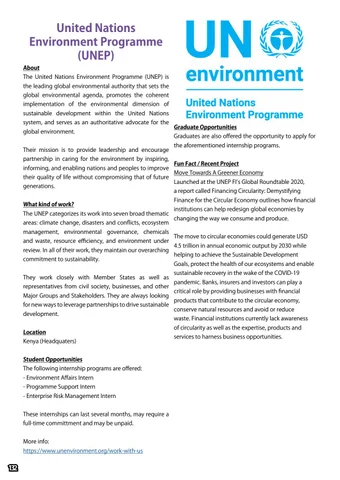United Nations Environment Programme (UNEP)
About
The United Nations Environment Programme (UNEP) is
the leading global environmental authority that sets the
global environmental agenda, promotes the coherent implementation of the environmental dimension of
sustainable development within the United Nations system, and serves as an authoritative advocate for the global environment.
Their mission is to provide leadership and encourage
partnership in caring for the environment by inspiring, informing, and enabling nations and peoples to improve their quality of life without compromising that of future generations.
What kind of work?
The UNEP categorizes its work into seven broad thematic areas: climate change, disasters and conflicts, ecosystem
management, environmental governance, chemicals and waste, resource efficiency, and environment under review. In all of their work, they maintain our overarching commitment to sustainability.
They work closely with Member States as well as
representatives from civil society, businesses, and other
Major Groups and Stakeholders. They are always looking
for new ways to leverage partnerships to drive sustainable development.
Location
Kenya (Headquaters)
Student Opportunities
The following internship programs are offered: - Environment Affairs Intern
- Programme Support Intern
- Enterprise Risk Management Intern These internships can last several months, may require a full-time committment and may be unpaid. More info:
https://www.unenvironment.org/work-with-us
132
Graduate Opportunities
Graduates are also offered the opportunity to apply for the aforementioned internship programs.
Fun Fact / Recent Project
Move Towards A Greener Economy
Launched at the UNEP FI’s Global Roundtable 2020, a report called Financing Circularity: Demystifying
Finance for the Circular Economy outlines how financial institutions can help redesign global economies by changing the way we consume and produce.
The move to circular economies could generate USD 4.5 trillion in annual economic output by 2030 while helping to achieve the Sustainable Development
Goals, protect the health of our ecosystems and enable sustainable recovery in the wake of the COVID-19
pandemic. Banks, insurers and investors can play a critical role by providing businesses with financial products that contribute to the circular economy, conserve natural resources and avoid or reduce
waste. Financial institutions currently lack awareness of circularity as well as the expertise, products and services to harness business opportunities.











































































































